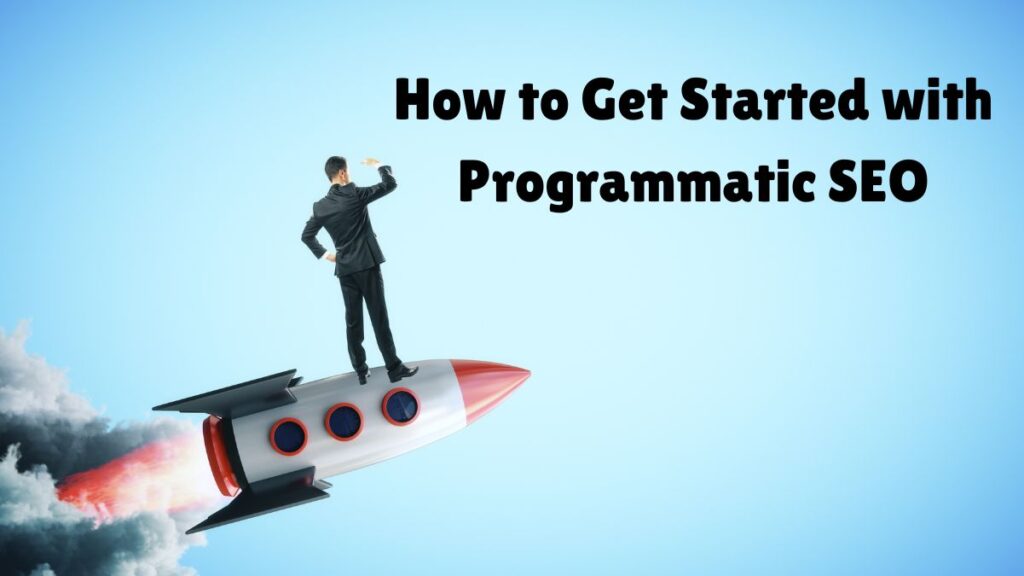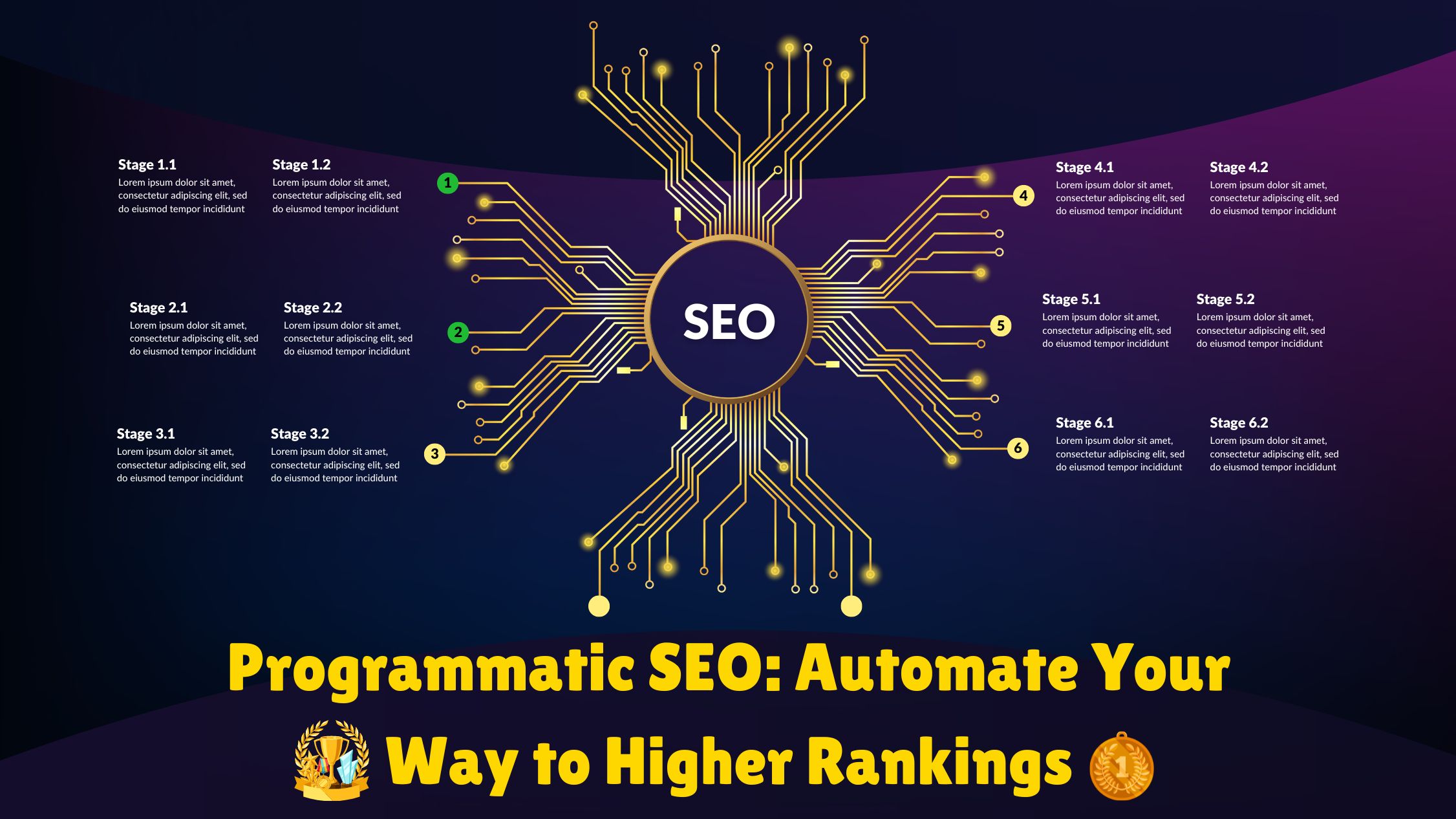It takes more than just conventional SEO strategies to keep ahead of the competition in the dynamic world of digital marketing. Programmatic SEO has changed the game by enabling marketers to automate complex SEO procedures and obtain higher ranks with less manual labor as automation and artificial intelligence have grown in popularity.
I can state with confidence that programmatic SEO is not only a trend but rather a need for everyone serious about their online presence because I have personally included this method in my website.
What is Programmatic SEO?
The technique of automating different SEO processes with tools, scripts, and algorithms to optimize content at scale is known as programmatic SEO. With this method, you may create thousands of search engine-optimized pages while reducing the amount of human work that is usually involved in traditional SEO.
I was dubious when I initially learned about programmatic SEO. The idea of automating the laborious aspects of SEO while maintaining high ranks seemed too wonderful to be true. But after I got started and integrated it into my website, I saw its potential. The time saved was priceless, and the outcomes were outstanding.
How Programmatic SEO Works
Data is the foundation of programmatic SEO. You may produce highly focused and search-engine-optimized content by utilizing data from numerous sources, including competitor analysis, user behavior analytics, and keyword research tools.
Here’s how I implemented it:
- Keyword Research at Scale: I gathered a huge list of long-tail keywords using tools like Ahrefs and SEMrush, rather than manually identifying keywords. After that, these were entered into a script that categorized them according to search volume and intent.
- Automated Content Generation: I created landing pages for each keyword group automatically using content templates. Internal links, meta descriptions, and pertinent headers were added to each optimized page.
- Using dynamic content insertion: I was able to customize pages according to the location and behavior of the user. This enhanced both the user experience and the search engine relevancy of my website.
- Automation of Internal Linking: I used programmatic SEO to automate internal linking throughout my website, making sure that all pertinent pages were connected. This enhanced my site’s crawl ability and helped disseminate link equity.

The Benefits of Programmatic SEO
Programmatic SEO has several advantages, and after using it, I observed the following main ones:
- Scalability: Hundreds of pages might have been created and optimized in a fraction of the time it would have taken if done by hand. For huge websites or those targeting a broad range of keywords, this scalability is essential.
- Consistency: My site’s user experience is excellent since automation ensured that every page adhered to the same SEO best practices.
- Time Efficiency: I was able to focus on more strategic areas of my digital marketing operations by automating repetitive tasks, which saved up significant time.
- Data-Driven Decisions: By enabling me to base choices on real-time data, programmatic SEO helped me make sure that my material always reflected the demands of users and the latest trends.
Challenges and Considerations
Even while programmatic SEO has many advantages, there are drawbacks. The following are some things I discovered along the way:
- Quality Control: Sometimes automation results in inadequate quality control. To make sure that the information produced remains pertinent and useful to users, it is crucial to routinely assess and improve your automated processes.
- Technological Know-How: Programmatic SEO implementation calls for a certain degree of technological know-how. You could need to spend money learning how to code or hire someone to do the job if you’re not comfortable using sophisticated SEO tools.
- Over-Optimization: When employing automation, it’s simple to unintentionally optimize your material too much. Keep in mind that using black-hat SEO techniques like keyword stuffing can hurt your rankings.
Tools and Platforms for Programmatic SEO
Having the appropriate tools is crucial when it comes to programmatic SEO. These are a few of the instruments I employed that yielded notable results:
- Ahrefs/SEMrush: For thorough competition research and keyword analysis.
- Python scripts: For content creation, keyword grouping, and data collecting automation.
- Google Sheets API: For handling and arranging huge data collections.
- WordPress plugins: Yoast and Rank Math are two examples of plugins that can automate on-page SEO activities like schema markup and meta data.
My SEO efforts were greatly streamlined by each of these tools, which freed me up to concentrate on strategy rather than tedious work.

Real-World Examples of Programmatic SEO Success
Here are some real-world examples that inspired me to help you better appreciate the potential of programmatic SEO:
- TripAdvisor: Millions of pages for various destinations, activities, and user-generated content are created by them using programmatic SEO. They have gained dominance in the travel search market thanks to this tactic.
- Yelp: Yelp creates dynamic pages according to company categories, location information, and user reviews. They have been able to increase local SEO ranks and scale their content thanks to this strategy.
These illustrations demonstrate the potency of programmatic SEO when used properly. Not only may chores be automated, but data can also be used to produce content that both consumers and search engines find interesting.

How to Get Started with Programmatic SEO
Here’s how to get started with programmatic SEO if you’re ready to dive in:
- Establish Your Objectives: Before starting, it’s critical to establish your programmatic SEO objectives. Do you want to scale your content generation, boost traffic, or enhance rankings? Your plan will be directed by your aims.
- Collect Information: To get information about keywords, user behavior, and rival tactics, employ SEO tools. The basis of your programmatic SEO efforts will be this data.
- Select the Correct Tools: Ascertain which platforms and tools will best enable your objectives based on your level of technical proficiency. Make sure you have the necessary tools available, whether it’s WordPress plugins for on-page SEO or Python scripts for automation.
- Start Small: Take on a modest project or focus on one area of your website at first. This will enable you to evaluate your procedures and make necessary modifications before expanding.
- Refine and Monitor: Using programmatic SEO is not a one-and-done approach. Make sure your efforts are in line with your objectives by keeping a regular eye on your performance and making modifications as necessary.
Final Thoughts:
Including programmatic SEO on my website turned out to be one of the best choices I’ve ever made about digital marketing. I was able to scale my efforts to a level that would not have been feasible with conventional SEO techniques, in addition to saving time. The secret is to approach programmatic SEO with a data-driven perspective and keep improving your procedures to make sure your audience is receiving the finest content available.
I strongly advise doing programmatic SEO if you want to advance your SEO strategy. When used properly, this potent tool can greatly improve your rankings and increase traffic to your website.
FAQ’s
What is Programmatic SEO?
Programmatic SEO is an automated method of SEO that uses tools and data to optimize content at scale. It helps websites rank higher while requiring less human labor.
How does Programmatic SEO work?
It functions by employing tools and scripts to automate processes like content creation, keyword research, and internal linking. This makes it possible to swiftly produce vast amounts of optimized material.
What are the benefits of Programmatic SEO?
Scalability, consistency, time efficiency, and data-driven decision-making are among the advantages; these all help to raise search engine ranks and drive more traffic.
Are there any challenges with Programmatic SEO?
Indeed, there are difficulties in keeping up quality control, needing technical know-how, and avoiding over-optimization, which lowers rankings.
What tools are needed for Programmatic SEO?
Tools like Ahrefs for keyword research, automation scripts (like Python ones), and content management systems or plugins for on-page SEO are essential.

